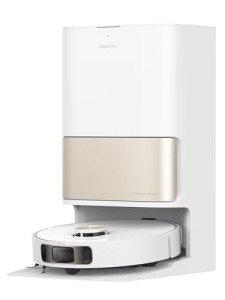The Rise of Robotic Vacuums: A Comprehensive Overview
In today's fast-paced world, technology is consistently evolving to make our lives simpler, and the family cleaning sector has witnessed one of the most noteworthy improvements: the robotic vacuum. This intelligent gadget not just saves time and energy but likewise makes sure a cleaner home environment with very little manual effort. This post looks into the remarkable development of robotic vacuums, how they work, their benefits and downsides, market trends, and future instructions.
The Evolution of Robotic Vacuums
Robotic vacuums have made terrific strides because their beginning in the late 1990s. The first commercially available robotic vacuum was presented in 1996, followed by various models, each developed with escalating elegance and functions. Here is a quick timeline of robotic vacuum advancement:
| Year | Occasion |
|---|---|
| 1996 | Release of the very first robotic vacuum (Electrolux's Trilobite) |
| 2002 | iRobot Roomba is launched, making robotics mainstream |
| 2010 | Intro of innovative mapping and navigation features |
| 2017 | Combination of AI and smart home compatibility |
| 2022 | Launch of highly advanced models including self-emptying dustbins |
How Robotic Vacuums Work
Robotic vacuums use a mix of sensors, algorithms, and expert system to browse areas efficiently. Here's how they operate:
- Navigation: Most robotic vacuums utilize a series of sensors to find obstacles and navigate around furniture. Some high-end models include LIDAR (Light Detection and Ranging) technology to create in-depth maps of the environment.
- Cleaning Mechanisms: They are equipped with turning brushes and suction mechanisms to gather debris from various surfaces. Depending on the design, they can shift in between carpets and tough floorings seamlessly.
- Smart Features: Many modern-day robotic vacuums are Wi-Fi allowed, allowing users to control them remotely by means of a smartphone app. Functions frequently include scheduling, drawing up cleaning courses, and combination with other smart home devices.
- Self-Maintenance: High-end units might feature self-emptying capabilities, where the robot can dock itself to a base that gathers dust and particles without human intervention.
Advantages of Robotic Vacuums
Robotic vacuums have amassed immense appeal, and for good factors. Here are a few of the most substantial advantages:
- Time-Saving: Automating the cleaning procedure enables users to engage in other significant activities.
- Effective Cleaning: Regular cleaning can be quickly achieved by arranging the robot to clean everyday or weekly, keeping dirt and allergens at manageable levels.
- Compact Design: Their small size permits them to fit under furniture and in hard-to-reach locations.
In spite of their benefits, robotic vacuums likewise include limitations:
- Limited suction power: While they are efficient for keeping tidy floors, they may not match the deep cleaning of standard vacuums.
- Battery life: Most designs need to return to their dock after a specific duration of usage.
- Preliminary expenses: High-quality robotic vacuums can be pricey, though costs have been reducing with advancements in innovation.
Present Market Trends
The market for robotic vacuums is expanding rapidly. According to a recent market research study report, the global robotic vacuum market is anticipated to reach ₤ 7.2 billion by 2027, growing at a CAGR of 23.5%, driven by several factors:
Increased Adoption of Smart Home Devices
The rise of smart home innovation has motivated customers to integrate robotic vacuums into their households. best robot vacuum for large house of robotic vacuums work seamlessly with home assistants like Amazon Alexa and Google Assistant, streamlining their operation.
Advances in Robotics and AI
As the innovation behind robotic vacuums develops, designs are being equipped with better navigation systems, AI algorithms for discovering personal cleaning practices, and improved functions for specific floor types.
Focus on Health and Hygiene
The increased awareness of cleanliness and health, especially due to current international events, has actually driven customers to invest in devices that routinely get rid of dust, irritants, and family pet hair from their homes.
Future Directions
As technology advances, robotic vacuums are anticipated to evolve even more, including features that increase their efficiency in households. Expected advancements consist of:
- Improved AI Learning: With improvements in device knowing, future models will be much better at understanding their environment and adapting to the requirements of their owners.
- Multi-Purpose Design: Potential future designs might consist of functions for mopping, sanitizing, and air purification in addition to vacuuming.
- Sustainability: As eco-consciousness increases, producers are likely to concentrate on energy performance, recyclable materials, and sustainable production practices.
FAQs About Robotic Vacuums
1. Can robotic vacuums vacuum on carpet?Yes, many robotic vacuums can transition in between various floor types, including carpets and difficult floorings. 2. How frequently should best robot vacuum deals run my robotic vacuum?It depends
on your household's cleaning requirements, but lots of users
schedule their robotic vacuums to run daily or every number of days. 3. Are robotic vacuums worth the investment?For many consumers, the time conserved and convenience offered by robotic vacuums makes them beneficial,
specifically for hectic households. 4. Can I manage my robotic vacuum remotely?Most modern robotic vacuums can be managed via a smart device app, permitting scheduling and tracking from anywhere. 5. Do I still require a traditional vacuum cleaner?While robotic vacuums effectively manage day-to-day cleaning, a conventional vacuum might still be necessary for deep cleans or toughermesses. The improvement of robotic vacuums shows a significant leap in automating housework, integrating ingenious innovation with easy to use operation. As the trend toward smart homes continues and consumer expectations develop, robotic vacuums will likely keep enhancing, providing ever-greater convenience and performance in preserving clean home. As property owners consider the potential advantages and constraints of these devices, it is clear that robotic vacuums have actually solidified their track record as vital tools in modern-day home management.

